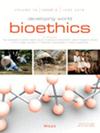Ethical analysis of informed consent methods in longitudinal cohort studies: A Chinese perspective
IF 0.9
3区 哲学
Q3 ETHICS
引用次数: 0
Abstract
In longitudinal cohort studies involving large populations over extended periods, informed consent entails numerous urgent challenges. This paper explores challenges regarding informed consent in long‐term, large‐scale longitudinal cohort studies based on the longitudinal and dynamic nature of such research. It analyzes and evaluates widely recognized broad consent and dynamic consent methods, highlighting limitations concerning their ability to adapt to evolving research objectives and participant perspectives. This paper discusses trust‐based informed consent and emphasizes the needs to establish and maintain trust with research participants and to balance information disclosure with respect for participants' autonomy. Informed consent in long‐term studies is an evolving process that must adapt to changing research environments. Based on participant trust, researchers should observe and assess potential research risks. Finally, the paper recommends enhancing institutional credibility, implementing reconsent procedures, and ensuring robust ethical oversight to safeguard participants' rights despite the complexity of modern biomedical research.纵向队列研究中知情同意方法的伦理分析:中国视角
在涉及大量人群的长期纵向队列研究中,知情同意会带来许多紧迫的挑战。本文基于此类研究的纵向和动态性质,探讨了长期、大规模纵向队列研究中的知情同意所面临的挑战。本文分析并评估了广泛认可的广泛同意和动态同意方法,强调了这些方法在适应不断变化的研究目标和参与者观点方面的局限性。本文讨论了以信任为基础的知情同意,强调需要建立并保持与研究参与者的信任,并在信息披露与尊重参与者自主权之间取得平衡。长期研究中的知情同意是一个不断发展的过程,必须适应不断变化的研究环境。在参与者信任的基础上,研究人员应观察和评估潜在的研究风险。最后,本文建议,尽管现代生物医学研究十分复杂,但仍要提高机构的可信度,实施重新同意程序,并确保强有力的伦理监督,以保障参与者的权利。
本文章由计算机程序翻译,如有差异,请以英文原文为准。
求助全文
约1分钟内获得全文
求助全文
来源期刊

Developing World Bioethics
医学-医学:伦理
CiteScore
4.50
自引率
4.50%
发文量
48
审稿时长
>12 weeks
期刊介绍:
Developing World Bioethics provides long needed case studies, teaching materials, news in brief, and legal backgrounds to bioethics scholars and students in developing and developed countries alike. This companion journal to Bioethics also features high-quality peer reviewed original articles. It is edited by well-known bioethicists who are working in developing countries, yet it will also be open to contributions and commentary from developed countries'' authors.
Developing World Bioethics is the only journal in the field dedicated exclusively to developing countries'' bioethics issues. The journal is an essential resource for all those concerned about bioethical issues in the developing world. Members of Ethics Committees in developing countries will highly value a special section dedicated to their work.
 求助内容:
求助内容: 应助结果提醒方式:
应助结果提醒方式:


